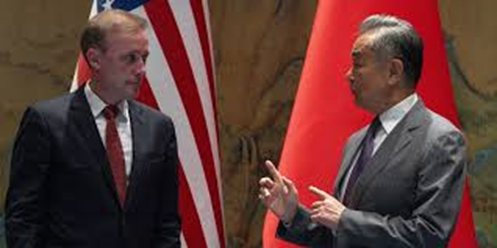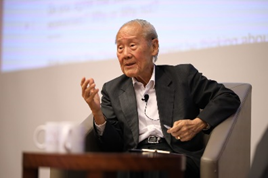Sports are not my strong suit. Nonetheless, I do cheer
our Malaysian players when they enter finals in international badminton games. And
like most ethnic Chinese, I also feel very upbeat when I see Chinese sports man
or woman excel, simply out of kinship pride. In the recent Olympics in France, my
wife and I spent hours switching from TV channel to channel, searching for performances
by participants from China to cheer or celebrate in our own space.
Malaysia is strong in badminton, but our team could
only bag 2 bronzes. We are still fledglings in the other sports.
On the
other hand, China entered the final day of Paris 2024 with a 39-38 edge on the
U.S. But the day saw the US took two more gold medals – women’s basketball and
women’s omnium (which the country bumpkin in me had never heard of before this). China managed one more, in women’s +81kg weightlifting. The
final scoreboard was the US 40, 44 and 42 (126), and China 40, 27 and 24 (91).
Japan came in third, which is the same position they
held in Tokyo 2020. Russia and Belarus, unfortunately, have again been left out.
Some chauvinists like me thought that China’s gold
tally should be 44, for it should include Hong Kong’s 2 and Taiwan’s 2. What a
form of self-gratification, silly me!
But I
was indeed trying to bring home a point. I was not suggesting China was better or had replaced
the US as the world’s No 1 sports power. However, it is clear to me that the US
is no longer the sole top dog in the Olympics. Many countries, even countries
with small populations, are now able to crane their heads and win disproportionately
high number of medals. The exception is India.
This trend
was already evident in Tokyo 2020. In July 2021 when Tokyo was hosting a
belated Olympics, I wrote this article “What does Tokyo Olympics 2020 say about
America?” It attracted some 50,000 readers. Unfortunately, I have accidentally
deleted the article from the blog, but please access the following link to read
it if you are interested:
https://drive.google.com/file/d/1sribkF0P07-KMq5miqsuK04aWVbIWhCd/view?usp=sharing
I remember CNN first screamed with this headline then: This US
fails to win medal on first day of Summer Olympics for the first time in nearly
50 Years. Then I woke up on the 26th morning to read this: USA
Basketball defeated in first Olympic loss since 2004. I knew the world had
changed.
But much of West’s attitude towards China has hardly changed. Especially
the Americans.
Americans are seeing Chinese ghosts everywhere,
including sports.
In the final weeks of Trump’s presidency, he signed
into law that gave the US vast powers to police doping at competitions like the
Olympics. The law allows its Justice Department to CRIMINALLY prosecute
coaches, trainers, doctors, and sports officials from AROUND the world if they engage
in facilitating doping, even if the event is held outside the US. See how
arrogant America can be!
(Apparently, the Justice Department is still
investigating whether Chinese antidoping authorities and the World Anti-Doping
Agency (WADA) have covered up the positive tests of nearly two dozen Chinese
swimmers who went on to win medals at the last Tokyo Games even though a World
Aquatics audit had concluded that there was no mismanagement or cover-up by WADA.
And this incident is still being used by South China
Morning Post, a pro-West media in Hong Kong to help fan the suspicion. In its 5
August edition, Ira Gorawara wrote that the UK’s three-time Olympic gold
medalist Adam Peaty wants “cheating” Chinese swimmers knocked out of the sport
and urged WADA to “wake up and do your job”.
Peaty was angry that China had won the men’s 4x100
metres medley relay gold, ending US’s 40-year reign of that throne. Peaty was
suggesting that there was more to the race than meet the eye. Gorawara again
brought up the Tokyo incident but did not bother to say that the swimmers had been
officially cleared. Journalists in SCMP, as I have said before, can
be naughty. They are subtly anti-China, and guess who is the owner? Jack Ma!
Earlier,
Australian swimming coach Brett Hawke also suggested that Pan Zhanle’s
world-record 100 metres freestyle time was “not humanly possible”. He was
simply implying that Pan must have the help of “booster” in achieving his
“incredible” feat.
Pan said
he had been given the cold shoulder by some of the other swimmers, had to
undergo 21 doping tests from May to July. (Apparently, all in all, the Chinese
swimming team had to undergo some 600 tests!)
Chinese
were seen as pariahs by many. Below are two snapshots of a video clip I
received from a friend. On seeing the French swimmer Léon Marchand approaching,
a Chinese swimming coach stretched out his hand to shake the former’s hand.
Marchand deliberately ignored the latter and walked on. Was Marchand just
showing his unfriendliness? I bet it is more than that. It must be his
prejudice against Chinese that is the root cause.
Yes,
sports men and women who want to cheat to win should not be allowed to compete.
In the earlier eras, many did and got away scot-free. Testing was not so
rigorous then.
It
is a different reality now. No prohibited drug can escape detection. I dare say
that many of those who tested positive are likely to be innocent. The first
question any governing body in the sports world should establish is: Was there
a deliberate attempt to cheat or take advantage of? Understanding of cultures
is important. Chinese parents were forever fussing over their children to eat
this and drink that before examinations. Much of TCM’s goodness is based on
certain properties of living things, both animals and plants, and organic
substances. These tonics can contain prohibited enhancers.
The
parents want their children to do well. This is also a form of unfairness.
Should children be subject to dope test? Ridiculous, isn’t it? Sports men and
women are also vulnerable; the food they inadvertently consume outside may
contain traces of banned chemicals. Can we penalise them wholesale? They would
not have taken then if they knew these things contain prohibited or dangerous properties.
Weightlifters
smell ammonia salt supposedly to help them stay focused, improve concentration
and lessen dizziness and pain. Should this be allowed to continue? Also, there
was the controversy over the true gender of two women boxers – one from Taiwan
and one from Algeria – who went on to collect gold. It is said that both had failed the eligibility
tests administered by the International Boxing Association, yet they were allowed
to compete in the Olympics. Isn’t this a very fundamental issue for the two
world bodies to resolve? Maybe the XY chromosomes stuff is not so straightforward
after all.
This
witch-hunting and “guilty until proven innocent” attitude against Chinese athletes
and swimmers should stop. I see that the Chinese side is also hitting back. CGTN
has reported that one of US’s Olympic track and field team, a certain Erriyon
Knighton, had actually tested positive for the banned steroid trenbolone in
March and yet USADA did not see fit to impose any penalty on Knighton and he was
allowed to compete in the Paris Olympics qualifiers. To the Americans, Knighton
had eaten meat that was contaminated with this substance. Maybe it is true. The
bottom line is there should not be any double standards. All should rise above all these discriminatory
behaviours.
Maybe
the world governing bodies should sit down and rewrite rules and apply them
without favour, fear or prejudice. And the world community should force the US to
repeal its extra-territorial laws. But again, as long as it is the hegemon of
the world, it can do pretty much what it likes.
Fortunately, gone are the days when we could only count on Reuters or
Associated Press or BBC or CNN to tell us news beyond our shores; today we have
CGTN, YouTube and TikTok to help us see other perspectives.
CGTN also reported that WADA had questioned the
integrity of the U.S. Anti-Doping Agency (USADA). Purportedly, there are at least three cases where athletes who
had committed serious anti-doping rule violations were allowed to continue to
compete for years while they acted as undercover agents for USADA. In one
case, an elite-level athlete, who competed at the Olympic qualifiers and international
events in the United States, admitted to taking steroids and EPO, yet was
permitted to continue competing all the way up to retirement. Apparently,
the case was never published, results never disqualified, prize money never
returned, and no suspension ever served. All very ironical and hypocritical.
To many westerners in the past, Chineseness was epitomized
by Christopher Lee’s portrayal of Dr Fu Manchu, a fictional character created
by an English author in the early 20th century. The image – someone
who donned the typical costume of the Qing era, and with a flowing mustache
that is now styled “Fu Manchu” and long, menacing fingernails – was supposed to
project cruelty and evil to the extreme, or the Yellow Peril incarnate in one
man. Fu Manchu was the typical Chinaman! Nothing good could come out of a
Chinaman. It is the mission of every good white man to destroy him!
Indeed, during the era, many Chinese, because of
abject poverty and widespread opium addiction, indeed looked like Fu Manchu,
but in a more pathetic form – filthy and aways in rags. This prompted the Japanese
who had a lofty vision of creating a Greater East Asia Co-Prosperity Sphere to treat
Chinese as sub-humans.
Then came China’s determination to catch up with the rest
of the world. Its market for technology trade-off was painted as IP thefts by the
affluent west.
This image of Chineseness has stayed with many in the
west, even until today. I suppose Gina Raimondo and Ursula von der Leyen are
amongst them.
And this prejudice has now spilled over to the Paris
Olympics 2024!
Two Saturdays ago, I attended an online lecture given by one of
the greatest living historians of our time, Prof Wang Gungwu, at HELP
University on 10 August. The title: China – From Middle Kingdom to World
Power: What of the Future?
You have to take your hat off to Prof Wang. He will be 94 soon,
yet he is still as sharp as ever. I will talk about his lecture in a different
time. But he thought the year 2008 was the watershed year. America was under
George Bush’s presidency. The global financial crisis (GFC) and China emerged
as the saviour. The obsession began to take shape. A beneficiary of the US’s
goodwill had transformed to be the benefactor. No way! A new Fu Manchu must be
created!
Sadly, many Yellow Bananas also share this belief!
I self-published this title two years ago: China’s Arduous
Journey to Earn Its Place, From Mr Q to President Xi Jinping. (https://drive.google.com/file/d/1yVFu9KhFlP2XsqI5gQMIf2kcwD3TLEc3/view?usp=drive_link) Besides the
economic and military powers that China is building, it is also important for
them to think more deeply how they should go about correcting the prejudices of
the deeply indoctrinated lot in the western world.










